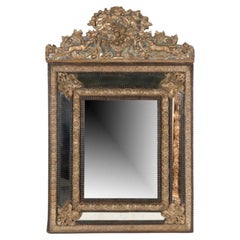Mirror Mjh Design Arts
Antique Late 19th Century European Baroque Revival Mantel Mirrors and Fi...
Brass
People Also Browsed
21st Century and Contemporary Swedish Mid-Century Modern Table Lamps
Textile
Antique Mid-19th Century French Napoleon III Wall Mirrors
Brass
Antique 19th Century Dutch Baroque Wall Mirrors
Brass
Materials: Brass Furniture
Whether burnished or lacquered, antique, new and vintage brass furniture can elevate a room.
From traditional spaces that use brass as an accent — by way of brass dining chairs or brass pendant lights — to contemporary rooms that embrace bold brass decor, there are many ways to incorporate the golden-hued metal.
“I find mixed metals to be a very updated approach, as opposed to the old days, when it was all shiny brass of dulled-out silver tones,” says interior designer Drew McGukin. “I especially love working with brass and blackened steel for added warmth and tonality. To me, aged brass is complementary across many design styles and can trend contemporary or traditional when pushed either way.”
He proves his point in a San Francisco entryway, where a Lindsey Adelman light fixture hangs above a limited-edition table and stools by Kelly Wearstler — also an enthusiast of juxtapositions — all providing bronze accents. The walls were hand-painted by artist Caroline Lizarraga and the ombré stair runner is by DMc.
West Coast designer Catherine Kwong chose a sleek brass and lacquered-parchment credenza by Scala Luxury to fit this San Francisco apartment. “The design of this sideboard is reminiscent of work by French modernist Jean Prouvé. The brass font imbues the space with warmth and the round ‘portholes’ provide an arresting geometric element.”
Find antique, new and vintage brass tables, case pieces and other furnishings now on 1stDibs.
Finding the Right Mantel-mirrors-fireplace-mirrors for You
Antique and vintage fireplace mirrors and mantel mirrors are sophisticated, classic pieces of decor, with the large size of fireplace mirrors making them centerpiece objects. They add character to any room and also create the appearance of space. Fireplace mirrors and mantel mirrors, like any well-placed antique or vintage mirror, can act as a source of light and make a room seem bigger than it is.
Fireplace mirrors were once a status symbol, as only the wealthiest could afford these big, beautiful pieces for their homes. In the 1500s and 1600s, the Venetian glass industry produced mirrors that were luxury items. Their painstaking creation was the result of a secretive process using melted tin, limiting their size and availability.
In the late 17th century, French glassmaker Bernard Perrot radically transformed mirrors. By casting glass into large, flat slabs, his work grew into an international market for mantel mirrors. These mirrors were often set in decorated frames.
French homes transitioned to lower fireplaces and mantels so tall mantel mirrors could fit above them. The design of fireplace mirrors reflected architectural trends. Some in the mid-18th century featured paintings, while others had delicate carvings.
By the 1800s, mantel mirrors had become more widely available. This reflected a dramatic change in glass mass-production technology, which made oversize mirrors more accessible, leading to their proliferation across the globe.
Today, mantel mirrors are still highly regarded statement pieces with an enduring reputation for elegance. Their versatility has allowed them to branch out beyond the fireplace. Their reflectiveness allows them to amplify a sumptuous painting in a bedroom or capture the tiling of a bathroom.
From mid-century modern designs to pieces created in Louis XVI style, there is a mirror for every room and every occasion on 1stDibs.
